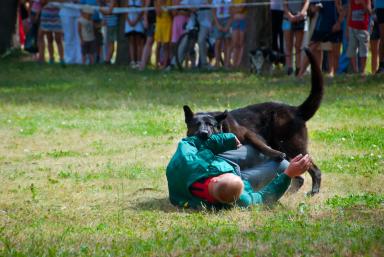Washington Dog Bite Laws

The U.S. sees over 4.5 million dog bite victims annually, and over 800,000 of that number require medical treatment. A dog bite is a serious injury, potentially leading to complications such as broken bones, nerve damage, infection, and disfigurement. If you are one of the many people who have been injured by an aggressive dog, you may be interested in learning about Washington’s dog bite laws, including how you can claim damages for your injuries.
This page will fill you in on some of Washington’s laws surrounding dog bites, including how liability is determined, how long you have to pursue a claim, and when a dog bite becomes a criminal matter in addition to a civil one.
Statute of Limitations in Washington for Dog Bite Claims
Washington State’s statute of limitations for personal injury claims is three years. If you wait longer than three years from the date of the dog bite to file a lawsuit, your case will be dismissed. Since personal injury claims are often negotiated for a long time before the plaintiff proceeds with a lawsuit, it is important to begin your process as soon as possible—long before those three years are up.
There are some exceptions to this rule. For example, if the defendant leaves the state to avoid civil action, their time out of state will not count toward the statute of limitations.
Liability Standards and Negligence in Washington Dog Bite Cases
In many types of personal injury claims, the plaintiff will have to demonstrate that their injuries were the result of the defendant’s negligent behavior. However, Washington has strict liability standards for dog bites. “Strict liability” means that the owner of a dog who bites someone is, with few exceptions, liable for that person’s injuries, regardless of whether or not those injuries were caused by the owner’s negligence. Even if the dog was properly secured and the owner had no reason to suspect that their pet might become aggressive, they could still be responsible for damages.
Many states have a “one-bite rule” that protects dog owners from liability if their dog has not shown signs of aggression before. Washington does not have such a rule. An owner of a dog who has never bitten anyone will still be liable if they attack someone unprovoked.
There are some exceptions to Washington’s strict liability standards. Someone who was bitten by an on-duty police dog will not be able to collect damages if the dog was handled “in good faith in the line of duty.” If the plaintiff was trespassing on a gated or fenced yard when they were bitten, they would not be able to collect damages as they did not have “implied consent” to be on the property. If the defendant can prove that the plaintiff goaded the dog, the court will not award the plaintiff damages.
Dog Owner Responsibilities in Washington
Since Washington uses a strict liability standard for dog bites, owners should take extensive precautions to ensure that their dog does not bite anyone. Caring for a dog in the following ways can help owners avoid ending up the target of an injury claim.
Adequate fencing. Constructing a fence around your yard tells passers-by that they are not allowed on your property. If someone ignores your fence and trespasses, you can argue that their injuries are their responsibility.
Leashing. Keeping your dog on a leash will make it easier to restrain them quickly if they begin acting aggressively. Allowing your dog to walk off-leash can leave you liable if they attack someone.
Taking proper care of your animals. Dogs who are abused or underfed are more likely to be aggressive. While some bites are random and unpredictable or the result of provocation by the victim, taking good care of your animal will lower the risk of them attacking someone unprovoked.
Muzzling a dangerous dog. The state of Washington considers any dog who has already attacked someone unprovoked to be “potentially dangerous.” A dog who has killed a pet, seriously injured a person, or attacked multiple people is considered “dangerous.” Dangerous dogs need to be muzzled and restrained at all times when off the owner’s property. There are no state-level requirements regarding potentially dangerous dogs, but local laws might have similar rules for them.
Breed-Specific Legislation
Breed-specific legislation is any set of laws that imposes restrictions and requirements for owners of certain dog breeds. Rottweilers and bull terriers—including pit bulls—are common subjects of breed-specific legislation.
Breed-specific legislation is a controversial topic. Certain breeds have statistically been proven more likely to exhibit aggression toward humans. However, some studies have suggested that imposing additional restrictions on owners of those breeds does not significantly affect dog bite incidence. Owners of restricted breeds sometimes feel that the legislation is too broad and argue that dogs of any breed can become aggressive if mistreated by their owners.
Washington allows counties and municipalities to make their own laws regarding specific dog breeds. Cities and counties can require owners of certain breeds to take extra preventative measures against aggression, can automatically define certain breeds as dangerous or potentially dangerous, or can ban certain breeds outright.
However, those laws have to offer an exception for dogs who pass a behavioral test. If a dog passes a test showing that they are unlikely to act aggressively, they do not have to abide by breed-specific legislation for at least two years. The law specifies the American Kennel Club’s canine good citizen test but notes that any test with similar standards can also exempt a dog from breed-specific legislation. The test assesses how a dog reacts to strangers, crowds, and other dogs, as well as their response to commands.
Penalties for Dog Attacks on Livestock in Washington
Washington law states that someone whose livestock is injured or killed by a dog can claim damages from the dog’s owner. These damages should account for the animal’s market value. For example, if a work animal is bitten by a dog and the injuries cause the animal’s market value to decrease by $1,000, the plaintiff is entitled to $1,000 in damages as well as the costs of collection.
Civil Penalties for Dog Bites in Washington
Someone who is found liable for a dog bite will have to pay damages to the injured party. These damages can be financial—for example, medical bills, physical therapy, and lost wages—or non-economic—for instance, compensation for physical and emotional pain and suffering.
Someone who was bitten by an aggressive dog can only receive compensatory damages by filing a personal injury claim. If the dog’s owner has homeowner’s insurance, renter’s insurance, or pet insurance, you can file a claim with their insurer. If they do not have liability protection, or if your attorney advises you to do so, you can file a civil lawsuit for personal injury.
Criminal Penalties for Dog Bites in Washington
Washington considers some dog bites to be so serious that they warrant criminal penalties. If a dog who has been registered as dangerous attacks a person or a domestic animal, the owner will be charged with a class C felony. An owner will face the same charges if their dog kills or seriously injures a person or a domestic animal, even if the dog was not registered as dangerous. A dog bite that causes broken bones or disfiguring cuts can lead to the same penalty.
A class C felony can lead to up to five years in prison and $10,000 in fines. However, if the dog’s owner can demonstrate that the victim was willfully trespassing, or that they goaded the dog into attacking, they may be able to avoid criminal penalties.
Reporting and Handling Dog Bite Incidents
If you have been bitten by a dog, the following steps will help you protect your health and prepare for possible civil action:
Seek immediate medical attention at an emergency room or urgent care center. Dogs’ mouths can harbor dangerous bacteria, and bite wounds leave you vulnerable to further infection. These infections can be life-threatening if left untreated.
Get the owner’s information. You will need to be able to get in touch with the owner if you decide to pursue a civil claim, and animal control will have to contact them.
Report the bite to your county’s animal control office. They may have to hold the dog for a few days while keeping an eye out for symptoms of rabies. If those symptoms are present, they will advise you to get a rabies vaccine and may notify the public of a potential rabies outbreak. Reporting dog bites to animal control can help other potential victims avoid being bitten.
File a police report. It will be helpful in the event that the bite constitutes a criminal offense and will serve as valuable evidence for your claim.
How To Find a Dog Bite Attorney in Washington
If you are interested in pursuing civil action, look for a personal injury lawyer who has experience with dog bite claims to assist you. Expertise.com’s personal injury attorney database rates lawyers based on professionalism and reputation in order to help you make an informed decision.
While you do not need a lawyer to file a claim, doing so on your own is risky. Your opponent’s insurer is likely to be aggressive in their attempts to avoid paying damages, and they could find arbitrary reasons to reduce your settlement or deny it outright. An attorney who specializes in dog bite claims will be a major asset when you are fighting for appropriate compensation.
Expertise.com StaffAuthor
Step into the world of Expertise.com, your go-to hub for credible insights. We don't take accuracy lightly around here. Our squad of expert reviewers, each a maestro in their field, has given the green light to every single article you'll find. From rigorous fact-checking to meticulous evaluations of service providers, we've got it all covered. So feel free to dive in and explore. The information you'll uncover has been stamped with the seal of approval by our top-notch experts.




